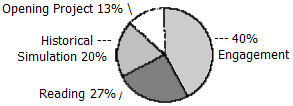HSci 1815 || Intro to History of Science: From the Scientific Revolution (Fall 2005, Instructor: Douglas Allchin)
Course Information:
Books ||
Evaluation ||
Academic Integrity
HSci 3815 •
Evaluation Form
Books -- available at Coffman Bookstore
Course Reader — see reading list. Print cover page.
For your simulation, either: Richard Rhodes, The Making of the Atomic Bomb, or Rachel Carson, Silent Spring.
Week 12 will be based on individual readings.
- EVALUATION
- The most important element for your learning at the collegiate level is to become engaged with the material and to develop your thinking skills (in this class, interpreting texts and events in historical context, and articulating the nature of science through case examples). The course is structured on the principle that you take responsibility for your own learning. There is no single list of facts to memorize and repeat on an exam, as dictated by an instructor. You choose to some degree what you will learn and, likewise, how to demonstrate what you have learned (guidelines below). Each student completes a form outlining how they elect to be evaluated. Each student also submits a self-evaluation (with a letter grade) at the end of the course.

Required (60%):
Attendance and participation in class discussion — expected. Your final mark may be raised (or lowered) 1/3 grade (ex: B => B+) for notably strong (or weak) contributions. For each class missed, the final grade is lowered 1/15 of semester's work, or 1/3 letter grade.
Introductory project -- analysis of popular history. (13%)
Historical Simulation [Committee on Uranium; Hearing on Pesticides]. (20%)
Evidence of reading and engaging texts (27%)
Each class involves discussion of reading, typically an original historical source. It is important to complete the reading and to have thought about it before class. You must document your preparation for class. In some cases, your work may be evident through your participation and comments in class. However, many students prefer a maintain a lower profile and engage only in small group discussion. If so, you must post your thoughts by the Tuesday before Thursday class on the class discussion list. Your comment should refer to at least one section of the text (use page #).
- Perhaps respond to an item from the weekly Reading Guide.
- Or, you may pose discussion questions (not simple factual inquiries), profiling how the question arises from the reading and why it seems important.
- You may elaborate on an earlier student comment (referring on your own, again, to the text).
Elective Forms of Evaluation (40%)
A central aim of class is for you to engage the material intellectually and to think about the texts that you read and the topics we discuss in class. You may do this in many ways: in 2 short essays, through a journal/think-notebook (3rd/4th-yrs), in an essay final exam, or a combination of these. One essay (or project above) may be revised.
- Extension Essays. (20% each) Topics will be offered each week. Each essay is due the following week. These will parallel themes addressed in the final exam, but be completed on your own schedule and according your interests. They should be 3-4 pages (=800-1000 wds). They may be informal in tone, but should communicate clearly and reflect thoughtful consideration of the issue(s). The advantage of the essays is that when they are done, this part of your grade is done.
- Journal. (up to 40%). You may prefer to keep a think-notebook, or journal, to organize your class and reading notes. This should not be merely a diary for expressing feelings or personal reactions. Rather, you should probe a topic, exploring its implications and/or adding personal examples. It should always amplify or extend the reading and go deeper than class discussion. This is an opportunity to record your engagement with the material, perhaps stronger for some weeks than others. The journal has the advantage that it is under your control, distributes the work throughout the semester, may be less stressful than an exam and can reflect your effort fairly directly. I will preview each journal once, upon request, before spring break.
- Final Exam. (up to 40%). This is elective. The exam will be 3 essays (choice of 6, 14% each), in which you will be expected to integrate general themes and specific examples from across individual class sessions.
- Special projects (up to 40%) — for example:
- redoing a historical experiment, or reconstructing and using a historical instrument or technology
- researching an episode from the history of the topic you study for your major
- [for teachers] a science curriculum case study or project focusing on "history and nature of science"
- extension work on your Historical Simulation.
All projects here must be preapproved.
Be sure to complete your form.
Academic Integrity
Discussion and collaboration are encouraged. However, all submitted work must be yours exclusively. It should reflect your own learning (for example, do not write while another class member is present). Acknowledge all sources and cooperation. Unsure what to cite?: see helpful guidelines. For principles and policies at this university, consult: www.osai.umn.edu/gopher.html. For rules of conduct, see: www.sja.umn.edu/conduct.html. Electronic technologies may be used to enforce this policy.
Return to HSci 1815 || Contact Information
|
